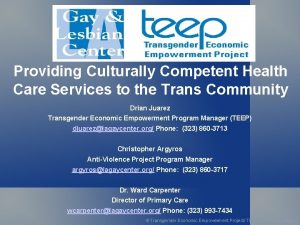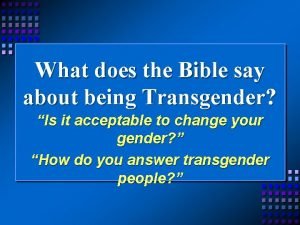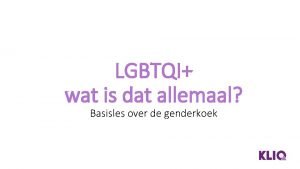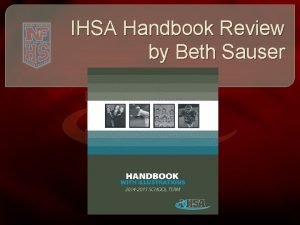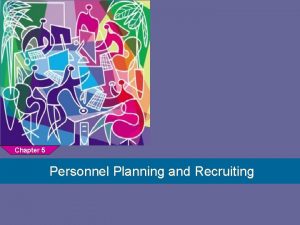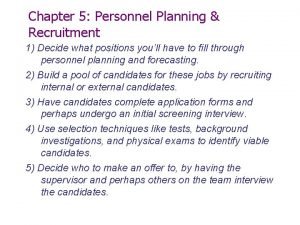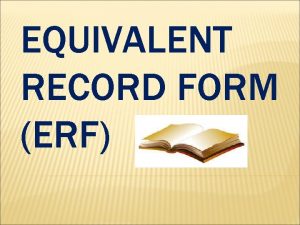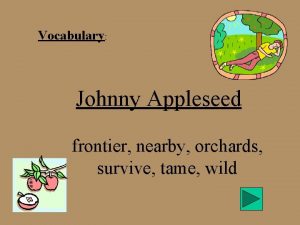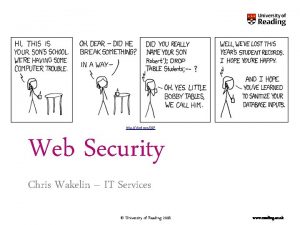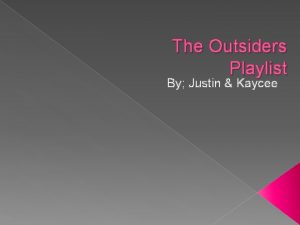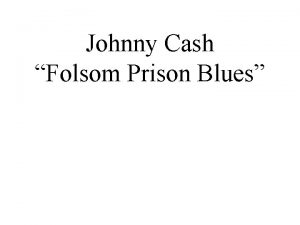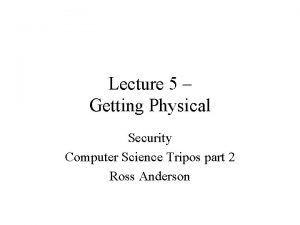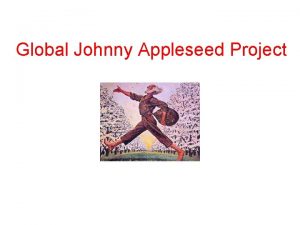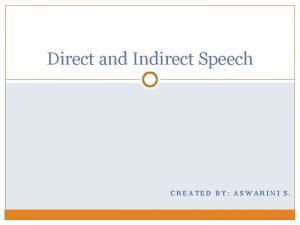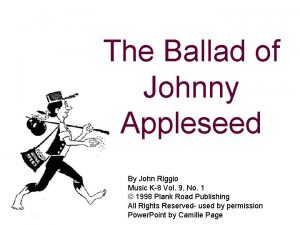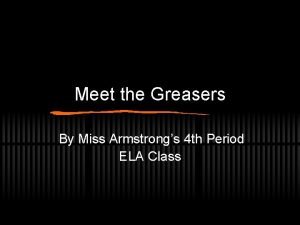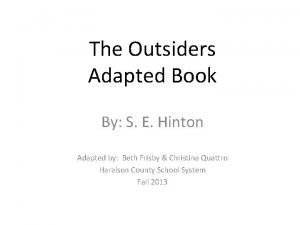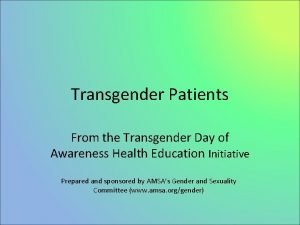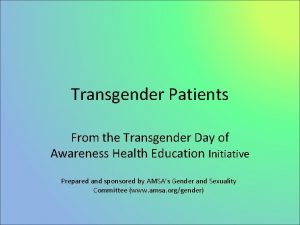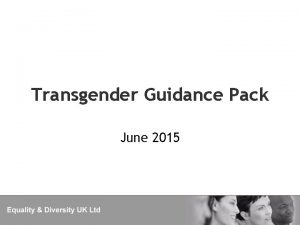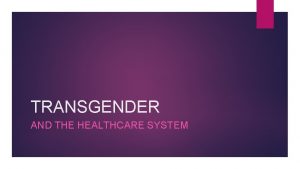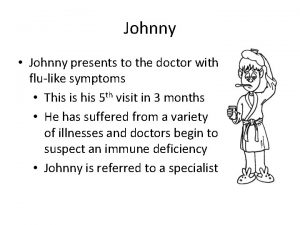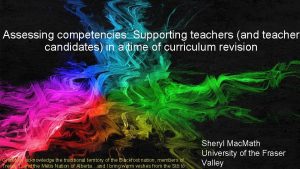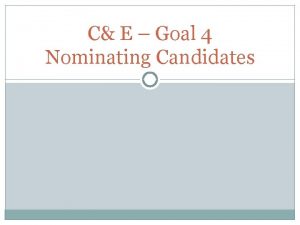From Johnny to Janie Supporting Transgender Teacher Candidates





















![Diversity in Teacher Candidates is Valued Social Justice Benefit • “If they [transgender candidates] Diversity in Teacher Candidates is Valued Social Justice Benefit • “If they [transgender candidates]](https://slidetodoc.com/presentation_image_h/c06acc8908d124d3cce7ca642194c960/image-22.jpg)





















- Slides: 43

From Johnny to Janie … Supporting Transgender Teacher Candidates in the Placement and Employment Process Presentation to AACTE March 2018 Dr. Laura Hart, UNC Charlotte Dr. Walter Hart, Winthrop University

Agenda • Review context – 10 minutes • Our study – 15 minutes • Workgroups – developing solutions – 25 minutes • Wrap up – 5 minutes • (flex time) – 5 minutes • Let’s get started!

Teachers in the 1950’s

The Times They Are A-Changin’

Some Definitions Gender Expression Gender Identity • External clues • Behavior, clothing, hair • Internal sense of gender (sense of themselves as male or female) • May be different from one’s assigned sex

However, not everyone whose appearance or behavior is gender-atypical will identify as a transgender person. Many transgender people live parttime or full-time as members of the other gender. TRANSGENDER Describes people whose gender identity or gender expression differs from that usually associated with their birth sex Broadly speaking, anyone whose identity, appearance, or behavior falls outside of conventional gender norms can be described as transgender.

The Civil Rights Act of 1964 - Title VII • Outlawed workplace discrimination based on “race, color, religion, sex, or national origin. ” • “What did SEX mean in 1964 and what does SEX mean in 2018? ”

A Little History: Title IX – (1972) “No person in the United States shall on the basis of sex, be excluded from participation in, be denied the benefits of or be subjected to discrimination under any educational program or activity receiving federal financial assistance. ”

Recent History – U. S. Dept. of Education issues 2014 guidelines… • Transgender students are protected from sex-based discrimination under Title IX; public schools instructed to treat transgender students consistent with their gender identity in single-sex classes. • All students, including transgender students and students who do not conform to sex stereotypes, are protected from sex-based discrimination under Title IX. V E R E K O N I D 7 1 0 2

Legal Protections? • Price Waterhouse v Hopkins (1989) US Supreme Court found sex stereotyping to be illegal for a female accountant who was viewed as not acting female. Case established that gender stereotyping is actionable as sex discrimination. • Macy v. Holder (2012) EEOC ruled in favor of Mia Macy, a transgender woman whose promotion within a federal agency was revoked once she revealed her transgender status to her employers. • Obergefell v. Hodges (2015) made same-sex marriage legal throughout the United States.

HOWEVER • Discrimination against LGBTQ workers is not explicitly illegal under federal law. Therefore, overt discriminatory actions may be more common toward sexual minorities than other protected minority groups (Munoz & Thomas, 2006).

Evolving Views (Pew Research, 2016) Support for Gay Marriage 60% 50% 40% 30% 20% 10% 0% Support Oppose 2006 2016

Evolving Views (Pew Research, 2016) Support Gay Marriage 80% 70% 60% 50% 33% 40% 30% 20% 10% 0% Democrat Republican

So, What About Our Schools? • In a 2015 interview, Kevin Jennings, the founder of the Gay Lesbian Straight Education Network (GLSEN), noted that teachers are ill-prepared to address LGBTQ issues and opined that many school administrators avoid controversy by ignoring LGBTQ concerns (Education Week, 2015).

For EPPs working with P-12 partners … • Challenges of placements already difficult in many cases • P-12 partners not always responsive (a lot going on!) • Clash of cultures: University vs. Public schools climate • Mission of advocates for diversity • EPP may not realize a potential problem exists if student opts not to disclose

What does this mean for transgender candidates and potential teacher-employees? • Discrimination in hiring and promotion processes may still occur • Less workplace support, fewer social interactions, and a negative attitude toward LGBTQ colleagues • May affect school and community acceptance of transgender candidates and subsequent employment as teachers.

OUR STUDY • Investigate factors considered by P-12 partners in making a field placement for a transgender teacher candidate. • Specifically, we wanted to know: • Impact of increased educator diversity? • Candidate’s transgender status would impact the placement process? • District’s perception about community response, and would that impact the placement?

OUR STUDY • Qualitative study with school principals and human resource (HR) directors as the targeted participants. • Interviewed 14 school administrators, 7 principals and 7 HR directors • Variety of small and large districts in a large metro region from North and South Carolina • Sharing some qualitative data today

Emerging Theme 1: Diversity in Teacher Candidates is Valued "That is one of our goals. We are trying to increase our diversity to match the demographics of our students so they can relate to the folks who are like them and have more of an impact on them. " "We try to hire more minorities because that is what is representative of the student population. "

Diversity in Teacher Candidates is Valued Role Model Benefit “In a community such as this I think it is important for students to see a very diverse faculty/staff. It opens their eyes to a lot of different perspectives that they may or may not hear otherwise. ”

Diversity in Teacher Candidates is Valued Social Justice Benefit • "I think there is benefit to trying to bring in diversity, to really build that understanding about being human … and everything we are doing is trying to be better people. “
![Diversity in Teacher Candidates is Valued Social Justice Benefit If they transgender candidates Diversity in Teacher Candidates is Valued Social Justice Benefit • “If they [transgender candidates]](https://slidetodoc.com/presentation_image_h/c06acc8908d124d3cce7ca642194c960/image-22.jpg)
Diversity in Teacher Candidates is Valued Social Justice Benefit • “If they [transgender candidates] are open [i. e. , “out”], then I see an exposure to a changing world that we are going to have to roll with because it is not going the other way. So I think it opens the door to seeing these individuals as people wanting to make good and teach. ”

Emerging Theme 2 – Transgender Status May Impact Placement/Hiring of Candidates • Ten of the 14 participants (71%) described some aspect of that process that they would change to accommodate candidates because of their transgender status. • Important to note: participants expressed that they would use such knowledge to ensure a positive experience for the candidate.

Emerging Theme 2 – Transgender Status May Impact Placement/Hiring of Candidates Described these changes in terms of “good fit” “In fairness to the principal and the teacher working with the student teacher, there needs to be a plan in place before that student teacher arrives. What is the expectation so it is comfortable not only for the school but the student teacher coming to the school? If people were to ask questions, how do you respond? ”

Emerging Theme 2 – Transgender Status May Impact Placement/Hiring of Candidates • “You have to consider the teacher you are placing them with. I think you look at the part of the state that we are in—whether it is right or wrong to be open- or closed-minded— we have some very closedminded people, and it would be an unsuccessful experience just because who they [the candidates] are placed with and I think that would be unfair to everyone. ”

Emerging Theme 2 – Transgender Status May Impact Placement/Hiring of Candidates “I am concerned with making sure that the mentors that are available to be assigned to these people are ones that we feel would be good mentors … I am wanting to make the match that is the best match for that person whether transgender or not. ”

Emerging Theme 2 – Transgender Status May Impact Placement/Hiring of Candidates Passive Role in Placement All participants perceived that their districts defer to EPPs regarding the placement of student teachers. None of the participants personally meet student teacher candidates prior to placement in their schools, noting that they trust the colleges and universities they work with to provide acceptable student teacher candidates.

Emerging Theme 3 – Concern about Community Response to Transgender Candidates; Concern about Professionalism • Participants believed that acceptance of transgender student teachers/teachers in their districts would vary within regions of the district. Most believed that suburban areas would be more agreeable to having a transgender student teacher/teacher while rural areas would be the most resistant.

Community Response - Not In My Back Yard “In a rose-colored world I would love to say it doesn't matter. But truthfully I think it does matter in this community. I think it does. I think certain parts of the county would be more open and willing to accept but in other parts of the county they would not. When you bring transgender into this community there are people who do not want their child to be exposed to that. ”

Community Response - Not In My Back Yard “We all say it, ‘We are all inclusive. We welcome everybody. ’ Our board is overall moderate and conservative. This is something that might go against what most of them believe. They might support the idea in the abstract. The closer to them, the less likely they would be to support it. ”

Candidate Professionalism—“Don’t Ask, Don’t Tell. ” • “I just would not want that to be the platform at the school. Same with heterosexuality or homosexuality – that place is not a platform for your own personal beliefs. You are there to teach a curriculum rather than making it a personal platform. I would say that to any group, not just a transgender coming in. ”

Candidate Professionalism—“Don’t Ask, Don’t Tell. ” • “If you are trying to politicize something for propaganda, for attention, then we would have an issue. Just like we would have an issue with anyone else trying to promote their own social agenda. If a person comes in as a transgender student teacher and thinks they have a captive audience, then they have an issue that we will address. ”

EMERGING THEME 4: Uncertainty by Administrators on How to Handle Transgender Issues • "One thing I am hearing from a lot of principals regardless of their personal view, they are saying, ‘I just want to make sure I know what I am supposed to do or not do. ” • “Unfortunately, I don't know if we know enough to educate colleagues, parents, other than what is out there in the media. For us, [there will be] no action until we need to take action. ”

CONCLUSIONS: The desire to create diversity within faculties The desire to avoid potential controversy

CONCLUSIONS: • Leaders should anticipate resistance as they promote tolerance for LGBTQ workers’ presence in the workplace, and suggest that school and EPP leaders need to consider strategies to minimize this backlash.

Conclusions: • There is a significant lack of preparedness in school districts (and therefore, EPPs) for dealing with issues that are likely to arise related to the placement of transgender student teachers/teachers.

Recommendations: • More discussion is needed between school districts and EPPs regarding issues related to transgender student teachers (will dig into this today!). • Mutual understanding between P-12 school leaders and EPPs about legal issues, privacy issues, placement “fit, ” and how to address potential controversies is best developed when there is not the immediate pressure of a real conflict.

Recommendations: • There is not a “one size fits all” solution for this issue • Historically, other under-represented groups have faced similar challenges in pursuing workplace equity; how these previous challenges were addressed could provide lessons in proactively developing an approach for transgender candidates/employees.

Working on this challenge together … • With a partner or small group, turn and talk about these questions: 1. Consider your ST clearance/application processes, both with your EPP and with P 12 partners … are there mechanisms in place that might inadvertently “out” a candidate (i. e. , background checks)? How can we support candidates while protecting their privacy/dignity? What would that look like? 2. In what ways can we proactively work with P 12 partners on securing safe, effective placements for transgender candidates? Take about 8 minutes … then we will ask a few groups to share some responses, put them on screen.

Responding to questions 1 and 2 … • Internal processes: • Social media – considering your posts may be publicly available for others (good advice for everyone). Makes it challenging. • Considering name-use (Mr. , Ms. ) – supporting candidate’s choice • Privacy – do we have processes? FERPA would apply. “Is it okay for us to tell the district? ” • Careful of the language we use – want to create a safe space for students. • Who has access to paperwork? Fingerprinting, background checks – “Leave it in my box …” (maybe change this) • What about schools? Talking to P-12 partners about background check information … what about pronoun use. • Health forms – gender checked by a physician. Could this “out” them? • Students advocating for themselves – engaging with on-campus LGBTQ support groups

Responding to questions 1 and 2 … • External processes – working with P-12 partners: • LGBTQ groups on campus – training for P-12 partners? • Who are our resources for this work? In the community? (other civic groups, like police? Fire? Can we replicate that? ) • GLSEN – amazing resource. Specifically for education groups. • Proactive conversations with district leadership … are they open? Can we have some conversations about this? • Connecting it back to P-12 students who are transitioning … helps all students to have these conversations • Grants/collaborations for preparing pre-service and in-service teachers about these issues

Wrap-Up: • Leaders must acknowledge that the placement of transgender student teachers is going to occur with the subsequent opportunity to hire the same individuals as fulltime teachers. • Leaders should expect resistance to the placement of transgender student teachers or the subsequent hiring of transgender teachers • The best remedy is for leaders to respond proactively, establishing policies and regulations that outline acceptable procedures while specifically noting that discriminatory and illegal practices will not be tolerated.

THANK YOU! Laura Hart - lchart 1@uncc. edu Walter Hart – hartwh@Winthrop. edu
 The teacher has chosen candidates for my husband
The teacher has chosen candidates for my husband Transgender umbrella
Transgender umbrella Transgender
Transgender What does the bible say about transgender people
What does the bible say about transgender people Trans umbrella
Trans umbrella Wat is de genderkoek
Wat is de genderkoek Gnc knoxville tn
Gnc knoxville tn Ihsa handbook
Ihsa handbook What is transgender
What is transgender Gay symbol in genogram
Gay symbol in genogram Mount everest riddle
Mount everest riddle Transgender
Transgender Forecasting the supply of outside candidates
Forecasting the supply of outside candidates Recruitment cold calling clients script
Recruitment cold calling clients script Www.candidates.cambridgeenglish.org cs results online
Www.candidates.cambridgeenglish.org cs results online Presentation of candidates for confirmation
Presentation of candidates for confirmation Forecasting the supply of inside candidates
Forecasting the supply of inside candidates Employment forecasting
Employment forecasting Interviewing candidates chapter 7 ppt
Interviewing candidates chapter 7 ppt Recruitment yield pyramid
Recruitment yield pyramid A typical gd comprises of a small group of candidates
A typical gd comprises of a small group of candidates Chapter 7 interviewing candidates
Chapter 7 interviewing candidates Dressler
Dressler Forecasting the supply of outside candidates
Forecasting the supply of outside candidates Erf form for teacher 3
Erf form for teacher 3 Good afternoon dear students
Good afternoon dear students Cherry valance thoughts about inner self
Cherry valance thoughts about inner self Johnny appleseed vocabulary words
Johnny appleseed vocabulary words Johnny tables xkcd
Johnny tables xkcd Kth nada
Kth nada How to make a johnny appleseed hat
How to make a johnny appleseed hat The outsiders playlist
The outsiders playlist Johnny bravo jailhouse blues
Johnny bravo jailhouse blues Why johnny can't encrypt
Why johnny can't encrypt Johnny tractor y su pandilla
Johnny tractor y su pandilla Johnny appleseed project
Johnny appleseed project Mary kay and johnny
Mary kay and johnny Johnny abrahamsen
Johnny abrahamsen Johnny told me, “i have seen this movie.”
Johnny told me, “i have seen this movie.” Johnny appleseed bag
Johnny appleseed bag Two-bit physical description
Two-bit physical description Dally and sodapop
Dally and sodapop Buddy holly rockabilly
Buddy holly rockabilly Cash born
Cash born


